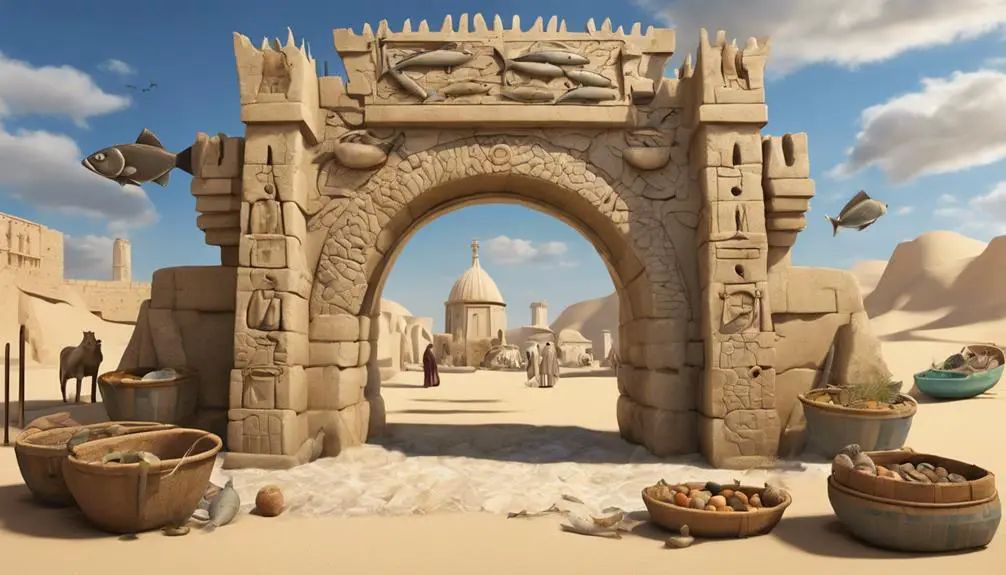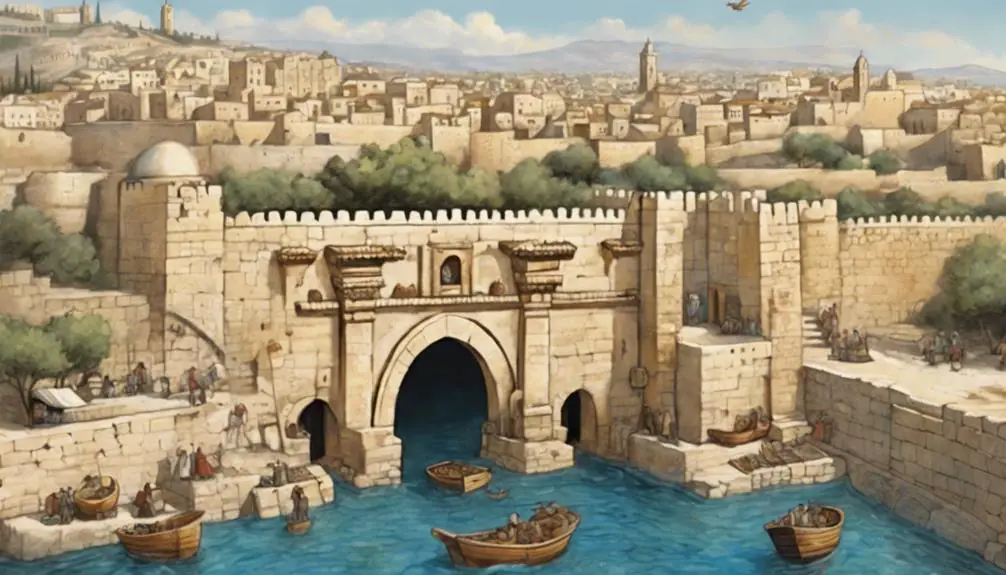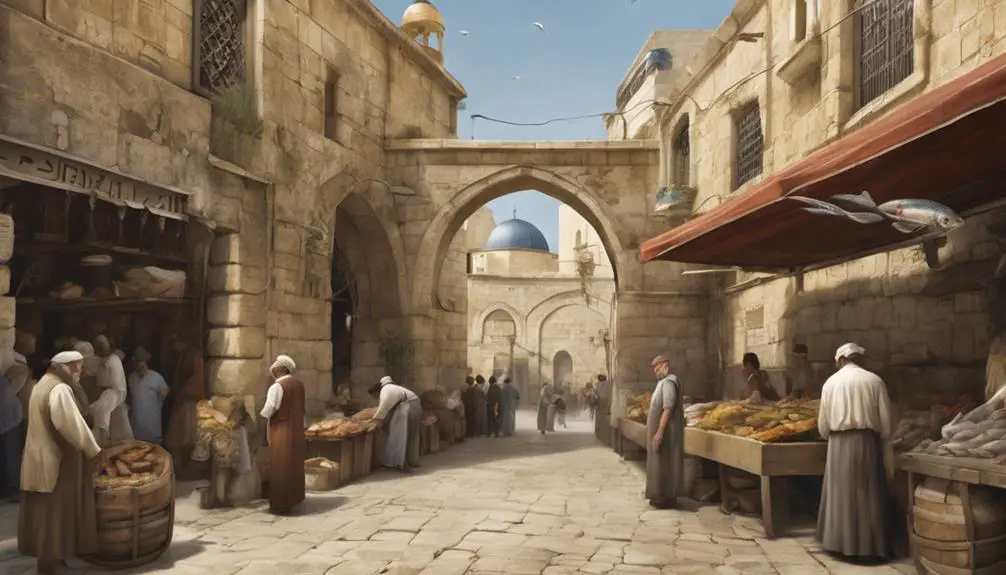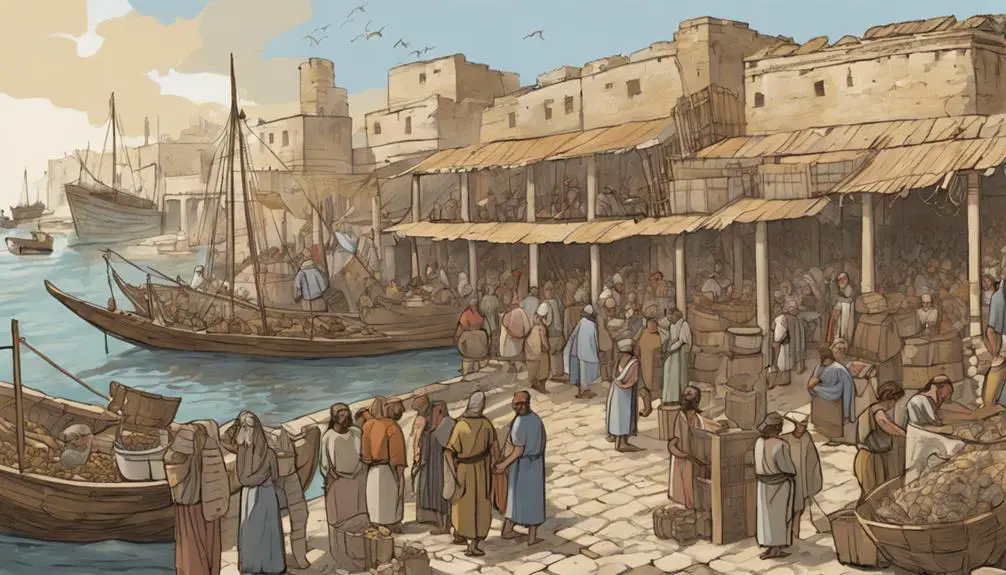Step into the past and uncover the mysteries of the Bible's Fish Gate, where ancient stories and spiritual symbolism await your discovery.

The Fish Gate in the Bible
In your time-traveling journey back to ancient Jerusalem, you'd find the Fish Gate more than just a historical footnote. It's a pivotal point where commerce, culture, and spirituality converge.
As you explore its historical background, biblical references, and economic significance, you'll uncover layers of spiritual symbolism that still resonate today. Modern interpretations of the Fish Gate offer a unique lens through which to view its enduring legacy.
The question that lingers, however, is how these ancient truths find relevance in our contemporary world. Let's embark on this exploration together, uncovering insights that bridge millennia.
Key Takeaways
- The Fish Gate was a crucial entrance in ancient Jerusalem, noted for trade and biblical significance.
- It played a pivotal role in Jerusalem's economy, especially in fish trade.
- Symbolized renewal and spiritual entry, linking to themes of transformation and divine encounter.
- Featured in Nehemiah's rebuilding efforts, highlighting its architectural and functional importance.
Historical Background

Delving into the historical context, it's crucial to understand that the Fish Gate served as a pivotal entryway into Jerusalem, deeply embedded within the city's socio-economic fabric during ancient times. This gate's location wasn't arbitrary; it was strategically placed to facilitate the bustling trade, particularly in fish, from the Mediterranean Sea and the Sea of Galilee to Jerusalem's heart. You'll find that the architectural design of the Fish Gate was both functional and symbolic, reflecting Jerusalem's reliance on trade and its spiritual significance.
The gate's design likely included features to accommodate the heavy traffic of merchants and goods, possibly incorporating a broad entrance to allow for carts and a courtyard for trade negotiations. It's essential to appreciate how the architectural elements of the gate served not just as a physical entryway but also as a testament to the city's economic vitality and cultural interchange.
Understanding the Fish Gate's role illuminates the complexity of Jerusalem's urban landscape in ancient times. It wasn't merely a point of entry; it was a nexus where economic, social, and possibly religious interactions converged, showcasing the city's dynamism and its residents' adaptability.
Biblical References

Having explored the historical significance of the Fish Gate, we now turn our attention to its mentions within the biblical narrative, where its role and implications are further illuminated. The Fish Gate, referenced in both the Hebrew Bible and the New Testament, serves as a poignant reminder of Jerusalem's intricate past, intertwining archaeological findings with theological discourse. Its geographical location, adjacent to the bustling marketplace and the city's northern wall, is key to understanding its significance in ancient societal structures and religious practices.
Reference |
Context |
|---|---|
Nehemiah 3:3 |
Describes the rebuilding of the Fish Gate by the sons of Hassenaah, highlighting its structural and communal restoration post-exile. |
Nehemiah 12:39 |
Part of the route taken by the procession during the wall's dedication, signifying its importance in communal worship and identity. |
2 Chronicles 33:14 |
Mentioned in the context of Manasseh's fortifications around the city of David, indicating its strategic importance. |
Zephaniah 1:10 |
A prophetic cry against Jerusalem mentions the Fish Gate, symbolizing divine judgment against the city's sins. |
Jeremiah 16:16 |
Although not directly mentioning the Fish Gate, it metaphorically refers to fishermen, possibly alluding to the gate's economic activities, which we'll not delve into here. |
This analysis underscores the Fish Gate's multifaceted role within the biblical narrative, enriched by archaeological discoveries and its pivotal geographical location.
Economic Significance

The Fish Gate's role extended beyond its structural and communal functions, acting as a crucial hub for Jerusalem's economic activities, particularly in the fish trade. This gate wasn't just a point of entry or exit; it was a vibrant commercial artery, pulsating with the flow of goods and wealth into the heart of the city. Its significance in the ancient economy can't be overstated, especially considering the intricate network of trade routes converging at this juncture.
- Trade Routes: The Fish Gate served as a pivotal crossroads for merchants from various regions, facilitating the exchange of goods and ideas along these ancient highways.
- Market Dynamics: It was a barometer for the economic health of Jerusalem, reflecting the supply and demand forces in the local and regional markets.
- Fish Trade: Specifically, it underscored the importance of the fish trade, connecting inland consumers with coastal and freshwater sources.
- Economic Integration: The gate played a key role in the economic integration of Jerusalem with the wider region, impacting trade policies and practices.
Analyzing the Fish Gate from an economic perspective reveals its foundational role in shaping market dynamics and trade routes, emphasizing its significance far beyond mere physical or spiritual dimensions.
Spiritual Symbolism

Beyond its economic impact, the Fish Gate also embodies profound spiritual symbolism within the biblical narrative, serving as a metaphor for renewal and entry into a sacred space. This symbolism is deeply embedded in the cultural practices of the time and has fueled theological debates for centuries.
You'll find that the Fish Gate's spiritual significance extends beyond its physical structure, reflecting broader themes of transformation and divine encounter. It's not just about the commerce of fish; it's about the journey of faith, crossing from the mundane into the holy.
To give you a clearer picture, let's examine a table that highlights key aspects of this symbolism:
Aspect |
Description |
Relevance |
|---|---|---|
Renewal |
Symbolizes purification and new beginnings. |
Echoes baptismal themes. |
Entry |
Represents access to God's presence. |
Reflects spiritual pilgrimage. |
Fish |
Early Christian symbol of faith. |
Bridges Old and New Testament beliefs. |
Cultural practices |
Influences interpretation of sacred texts. |
Shapes communal identity. |
Theological debates |
Spurs discussion on spiritual meanings. |
Enriches understanding of biblical symbols. |
Through this lens, you can appreciate how the Fish Gate isn't just a historical footnote but a rich tapestry interwoven with spiritual insights, cultural practices, and theological debates, offering a deeper understanding of its place in biblical tradition.
Modern Interpretations

Exploring how contemporary scholars interpret the Fish Gate's symbolism reveals its enduring relevance in today's theological discussions. You find that modern interpretations are deeply influenced by evolving cultural perceptions and ongoing theological debates. These scholarly perspectives offer a fresh lens through which to view this biblical artifact, underscoring its significance not only in historical contexts but also in contemporary religious discourse.
Modern interpretations typically focus on:
- Economic and Social Dynamics: Scholars analyze how the Fish Gate's role in ancient trade impacts understanding of economic structures within the Bible.
- Symbolic Meanings: The gate's symbolism is reinterpreted in light of current theological debates, offering new insights into biblical narratives.
- Cultural Perceptions: Changing views on religion and society influence how the Fish Gate is perceived in modern times.
- Theological Implications: The gate's significance is examined within the broader context of Christian theology, inspiring fresh discussions on faith and practice.
Frequently Asked Questions
What Specific Archaeological Findings Have Been Linked to the Original Fish Gate and How Do They Enhance Our Understanding of Its Structure and Function?
You're exploring how archaeological discoveries tied to the original gate boost our grasp of its architecture and purpose. Through excavation methodologies, researchers have unearthed remnants that are crucial for gate reconstruction.
These findings, from foundational structures to adjacent artifacts, offer a window into its historical significance and functionality. Analyzing these elements within a scholarly frame, you gain a deeper, contextual understanding of its role in ancient society, beyond its biblical mention.
How Has the Depiction of the Fish Gate Evolved in Religious Art and Literature Outside of the Bible, and What Cultural Influences Can Be Traced in These Depictions?
You're diving into how artistic renditions of maritime gates weave a rich tapestry of culture and faith, transcending their biblical origins.
These depictions, brimming with maritime symbolism, mirror societal changes and religious interpretations over centuries.
Analyzing them, you uncover how cultural influences shape their evolution in religious art and literature.
This journey offers a scholarly glimpse into the interplay between faith, art, and society, enriching your understanding of their historical and spiritual significance.
Are There Any Specific Festivals or Religious Ceremonies in Contemporary Times That Still Celebrate or Acknowledge the Historical Significance of the Fish Gate?
You're exploring whether modern festivals or ceremonies still honor the historical essence of a notable gate, focusing on its symbolic and renovated aspects.
While specific traditions may not directly celebrate this gate, its influence persists in communities valuing heritage. Fish symbolism often permeates local festivities, reflecting cultural and spiritual connections.
Gate renovations, meanwhile, signify the continual appreciation and preservation of history, ensuring its legacy influences contemporary celebrations, albeit subtly.
How Do Different Christian Denominations Interpret the Role and Importance of the Fish Gate in Their Religious Teachings and Practices Today?
You're diving into a sea of interpretations, where gate symbolism anchors the discussion. Denominational differences shine light on varied perspectives, each weaving their own tapestry of meaning around the Fish Gate.
Analyzing these viewpoints, you'll find they're not just historical footnotes but living, breathing parts of faith today. From metaphorical gateways to spiritual nourishment, each denomination crafts a narrative that enriches their religious teachings and practices, making ancient wisdom relevant in contemporary worship.
Can Parallels Be Drawn Between the Fish Gate and Similar Gates or Entryways in Other Ancient Civilizations, in Terms of Their Economic or Spiritual Significance?
Sure, you can find parallels with other ancient civilizations where gates or entryways had both economic and spiritual significance. Just like the Fish Gate, many cultures integrated maritime trade into their city's layout, with specific gates symbolizing trade and prosperity.
Additionally, these entryways often carried deep spiritual symbolism, marking them as sacred passages. This blend of practical and spiritual roles underscores a universal pattern across different civilizations, highlighting their multifaceted importance.
Conclusion
In wrapping up, you've journeyed through the layers of the Fish Gate, from its historical roots to its portrayal in the Bible, economic weight, and spiritual connotations.
This gate, more than just a passageway, symbolizes the intersection of daily life and divine instruction, akin to fish swimming through the vast ocean of human experience.
Your exploration reveals it's not just ancient stones but a beacon guiding us to understand our past, inform our present, and inspire our future.



Sign up